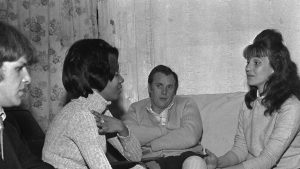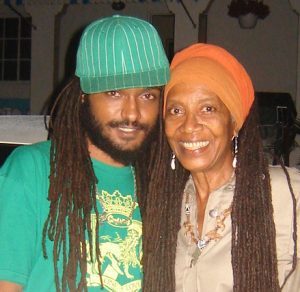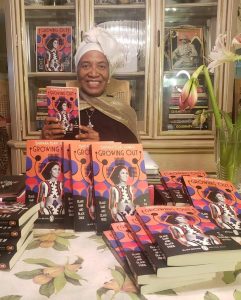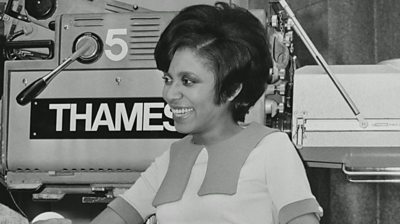Our next Sister that we’re saluting is a true trailblazer and visionary, Britain’s first black female TV reporter, renowned author, filmmaker, and journalist known for her promotion of Rastafari culture, Barbara Blake-Hannah.
Her story is one of courage, determination, and a relentless pursuit of change that continues to inspire generations of journalists, especially within the Black British community.
Early Years and Education
Barbara Blake-Hannah was born and raised in Jamaica in the 1940s and 1950s, but her journey to becoming a prominent figure in the history of journalism began in the United Kingdom. Arriving in London in the late 1950s, she was met with a culture that, at the time, barely reflected the diversity of the city that we know.
During her early years, she wrote articles for a monthly news magazine managed by her father, Evon Blake, who founded the Press Association of Jamaica. She said the experience “gave me a love of both reading and writing – and my revolutionary spirit”.
Barbara arrived in Britain, at age 24, with a dream of being in media and television and had her first gig working as an extra on the film A High Wind in Jamaica (1965). “Britain seemed to be opening up with opportunities at that time. I was young, living in London during the swinging 60s. It was all so exciting,” she says.
She then contributed to a wide range of publications such as The Caribbean Times, West Indian World, The Sunday Times, Queen, and Cosmopolitan.
A Trailblazing Broadcaster

The turning point in Barbara’s career came in 1968 when she became the first black woman to work as a television reporter in Britain, a milestone moment in British media history.
She wrote to a new television channel called Thames Television applying for a job as a reporter, for which she was selected, “I was the most interesting, I could write a good script and I made them laugh,” she said.
She was a warm and bubbly character on TV and landed marquee interviews with Prime Minister Harold Wilson and actor Michael Caine, and anchored everything from breaking news to The Beatles.
“To me, it was just another job. I would get briefed in the newsroom, go out to film, come back to edit, and be in the studio. I had already gone through the jitters of being on TV during my time in Jamaica, it was just really nice to be able to do what I enjoyed.”
At a time when diversity was often overlooked in the industry, Barbara’s presence on television screens across the nation sent a powerful message that change was not only necessary but also possible. She challenged stereotypes, broke down barriers, and opened doors for countless aspiring black journalists.
Despite all of that, she was dismissed after nine months without an explanation. Her producer later told her in confidence that the channel was receiving numerous calls from the public saying things like “Get that n***** off our screens.”
The channel also threw her under the bus when Secretary of State for Health and Social Care of the United Kingdom, Enoch Powell said that he would only do an interview with the station “on condition that ‘the Black girl’ was not there”.
Her departure didn’t faze her and she was determined to remain on TV and continue to break the barrier.
Six months later, Barbara was hired as a reporter for ATV in Birmingham and commuted from London to Birmingham until she found a room in the YWCA. She worked at ATV for a couple of years before joining the BBC as a researcher on the documentary series Man Alive, a documentary and current affairs program.
Back To The Caribbean

In 1970, Barbara was asked to do PR for the Jamaican film The Harder They Come, so she decided to leave the UK and return to Jamaica, where her contributions took the Jamaican Film and TV industry to new heights.
It was when she produced the film Rastafari (1982), that led her to reconnect with her Rastafari roots, where she became an avid promoter and champion of the culture. To this day, she serves as an executive for the Jamiacan Film Academy and hosts an international film festival in Jamaica, The Reggae Festival.
In the 1980s, she wanted to give back to the community and developed an interest in politics, and in 1984, was elected as an independent senator to the Jamaican parliament, becoming the first Rastafarian to serve.
A Lasting Legacy
Barbara Blake-Hannah’s pioneering work and unyielding commitment to inclusivity have left an indelible mark on journalism in the UK. Her legacy serves as a reminder that one individual, armed with determination and a passion for justice, can change the course of history.
The Press Gazette launched the “Barbara Blake-Hannah Prize” in 2020 to recognize emerging talented journalists from minority backgrounds.
According to a 2016 Oxford University survey, only 0.2% of journalists in the UK are black, despite black people making up 3.3% of the population.
“What happened to me 50 years ago has now turned into something that will recognize and create opportunities for young black journalists today. This is the most rewarding thing to have come out of my career.
As we celebrate Black History Month, Barbara Blake-Hannah stands as a testament to the power of one person’s resolve to reshape an industry and a society. Her remarkable journey embodies the spirit of change, resilience, and progress that continues to drive the ongoing fight for diversity and inclusivity in all aspects of life.

